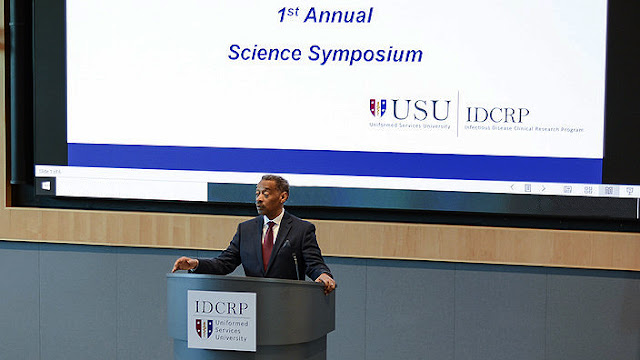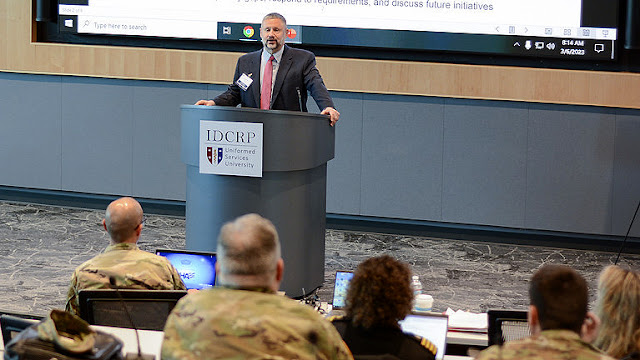USU President Encourages Attendees to "Think Outside the Box" at Infectious Disease Symposium
The Uniformed Services University's (USU) Infectious Disease Clinical Research Program (IDCRP) hosted its first Science Symposium, USU President gives welcoming remarks
 |
| USU President Dr. Jonathan Woodson delivered opening remarks during IDCRP's first annual Science Symposium March 6-10. (Photo credit: HJF communications) |
March 8th, 2023 By Sarah Marshall
Infectious diseases like COVID, HIV, and battlefield wound infections cause illness and disruptions that threaten health and military readiness around the world. To help foster collaboration in the field and share best practices, the Uniformed Services University’s (USU) Infectious Disease Clinical Research Program (IDCRP) hosted its first Science Symposium March 6-10.
The event was held in collaboration with the Defense Health Agency Infectious Disease Working Group Subcommittee. Army Brig. Gen. (Dr.) Clinton Murray, Commanding General, Medical Readiness Command, Europe/Command Surgeon, kicked off the event with a keynote address, speaking to the importance of infectious disease research in light of the ongoing operational landscape that demands anticipation of where and how the U.S. military and its allies need to be prepared to fight.
Throughout the week, the event included presentations on an array of relevant topics, such as emerging infectious disease diagnostics, clinical applications of new technologies, and clinical characteristics of COVID-19 reinfection.
In his welcoming remarks, USU President Dr. Jonathan Woodson told symposium attendees to think outside the box in seeking solutions to addressing infectious disease threats.
“Forums like this one provide outstanding opportunities to share lessons-learned and best practices,” Woodson said. “I look to all of you at this meeting to help us solve the difficult infectious disease challenges, from multidrug resistance and biofilms in war wounds, to skin and soft tissue infections in our basic trainees, to preparing us to respond rapidly to the next pandemic, whether from a next generation version of COVID or Ebola or bioterrorism, or an emerging infectious disease threat we don’t even know about yet. Lean forward! Push the envelope.”
IDCRP is the top resource for the Department of Defense to readily identify and assess infectious disease risks and is also the DoD’s global multi-center, collaborative clinical research network.
“IDCRP conducts clinical research to mitigate the impact of infectious diseases on military populations,” says Dr. Robert O’Connell, IDCRP director. The Center is also focused on improving care of the warfighter, and ensuring the military community is ready to respond whenever and wherever the next infectious disease outbreak occurs.
Now approaching its 18th year, the IDCRP has been successful in generating clinical research evidence to impact DoD policy and practice in the mitigation of infections affecting active duty servicemembers and MHS beneficiaries, said Dr. David Tribble, IDCRP’s science director and symposium organizer.
“This success is due to our partnerships with the military infectious disease clinical and research community, the NIAID/NIH, and other non-DoD partners,” Tribble said. “The IDCRP Science Symposium provides a forum to discuss the breadth of this effort, consider critical gaps, and develop future research.”
IDCRP plans to make the symposium an annual meeting to continue the critical joint information sharing, according to O’Connell. “This event will help us form and strengthen essential collaborative partnerships and focus our research strategy.”






